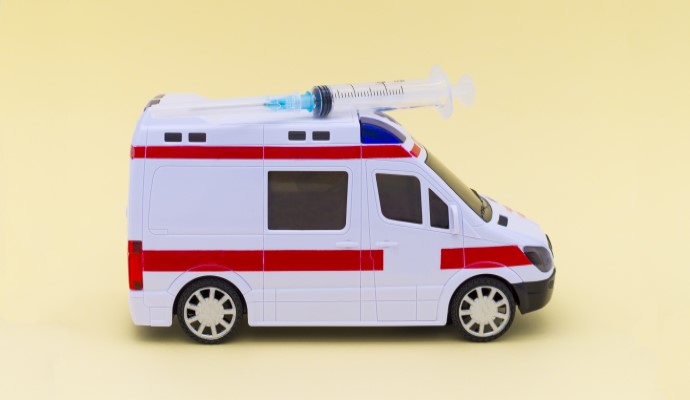HHS to Form Ambulance Billing Advisory Committee, Per No Surprises Act
The federal department will form a federal advisory committee to address ground ambulance billing practices as part of No Surprises Act implementation.

Source: Getty Images
- HHS is creating a federal advisory committee to address ground ambulance billing practices in its latest step toward No Surprises Act implementation.
In an announcement on Friday, HHS said the Ground Ambulance and Patient Billing (GAPB) Advisory Committee will deliver recommendations to several federal departments, including HHS, Labor, and Treasury, on how to protect consumers from “exorbitant charges and balance billing” when they use ground ambulance transportation to access care.
“No one should have to tap into their life savings to access life-saving care,” HHS Secretary Xavier Becerra, said in an announcement. “With today’s new advisory committee announcement, we will have the opportunity to engage with partners, experts and others, to better assess the issue of surprise medical billing tied to ambulance trips and work to better protect patients.”
The GAPB Advisory Committee is slated to meet at least twice, with a final report to be issued no later than 180 days after the initial meeting. Committee members will be self-nominated or nominated be an organization.
The No Surprises Act requires HHS and several other federal departments to create a federal advisory committee dedicated to addressing ground ambulance billing practices—a major source of surprise medical bills for consumers.
Surprise billing typically occurs when patients receive care from an out-of-network provider despite going to a facility within their plan’s network. The No Surprises Act aims to protect consumers from these usually high charges by prohibiting balance billing and predatory billing practices starting January 1, 2022. However, the protections do not apply to ground ambulance services, with lawmakers opting to first create the GAPB Advisory Committee to understand ambulance billing practices.
Ambulance rides are a major source of surprise medical bills and consumers generally do not have a choice on which ambulance company to use in emergency situations. A 2020 study published in Health Affairs found that nearly three-quarters of patients in a large national insurance plan received out-of-network bills for ground and air ambulance transportation between 2013 and 2017. The median charges on those bills were $450 for ground transportation and $21,698 for air transportation.
Researchers noted that air ambulance bills were larger but were less common. On the other hand, ground ambulance bills resulted in a total of $129 million in potential surprise bills per year during the period.
HHS has already addressed surprise bills from air ambulance services in a September 2021 proposed rule implementing the No Surprises Act. The rule seeks to codify existing penalties against healthcare providers, including air ambulances, for No Surprise Act violations. Air ambulance providers, for example, would face a penalty up to $10,000 under the Social Security Act for failure to submit data to the federal government on their costs and billing practices, per the No Surprises Act.
HHS intends for the data from both air ambulance providers and from the GAPB Advisory Committee to inform future surprise billing rulemaking.
“[The GAPB Advisory Committee’s] recommendations are expected to help inform policy changes that will improve the disclosure of charges and fees for ground ambulance services, better inform consumers of insurance options for such services, and protect consumers from balance billing, and that address steps that may be taken by proposals for legislation and enforcement at the state and federal levels,” HHS stated in the announcement.
